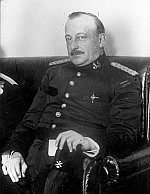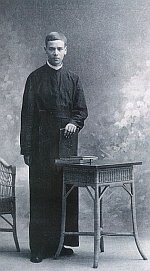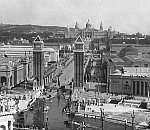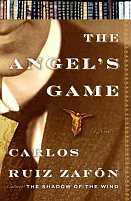HISTORICAL
FICTION
|
FICTION
|
|

|
|

General Primo de
Rivera
Spanish dictator, aristocrat, and a military official who was appointed
Prime Minister by the King and who for seven years (1923-1930) was a
dictator
|

Jesuit in Barcelona, 1920s
|

Barcelona, 1929
Click on image link to see full panoramic view
|
|
BOOK
ILLUMINATIONS
From Merrimon Book Reviews
HOME
ROMANCE
FICTION SUSPENSE & THRILLERS
MYSTERY
AUTHORS REVIEWER
PROFILES
|
The Angel's Game

by Carlos Ruiz Zafron

Dark,
gothic with a bit of a Faustian twist
In 1920s Barcelona,
novelist David Martin pens penny dreadfuls under the pseudonym Ignatius
B. Sampson for Barrido and Escobillas publishers. From his youth,
the novel Great Expectations given
to
him by the bookseller Sempere, has haunted his
literary aspirations. When a mysterious foreign publisher offers him a
deal he cannot resist and the freedom to write a novel that promises to
match his inspiration, the dream taunts him until he can no longer
resist. Obsessed by a love he cannot obtain and his desire to
write something meaningful, David enters a different world. A
manuscript from the Cemetery of Forgotten Books has a frightening
parallel to his own literary, mental and life journey. The
promise of literary freedom juxstaposes itself with the increasing
influence of publisher Andreas Corelli which seems to reach into all
areas of his life. As David struggles to unravel the threads that
bind him, Carlos Ruiz Zafron takes the reader on a journey through
Barcelona and the internal jounrey of a writer obsessed with a woman
and literature itself.
Somewhat of a prelude to his previous book, THE SHADOW OF THE WIND, Carlos Ruis
Zafron's THE ANGEL'S GAME is
part of a planned 4 book literary work. Readers familiar with the
first work will recognize certain characters and settings but this book
can be easily read as a stand alone or before the previously released
book. Dark and gothic, Carlos Ruis Zafron takes the reader on a
journey where real and not real combine to create a haunting exterior
and interior landscape full of intrigue. Striking connections
between the seemingly realistic events of the plot, literary allusions,
and the vision of writer obsessed with love and writing intertwine
throughout the narrative. At every turn, death touches the life
of the narrator David Martin, not only the prospect of his own death
but the death of love and the death of books and a sinister trail of
deaths of those around him. Plots and subplots twist and turn the
reader. Nothing is as it seems and yet everything is what is
seems --- though perhaps not on a literal level. Sometimes
chapters or sections end with an ominous tone, but will the ending bear
out the dark foreshadowing tone? Early on, THE ANGEL'S GAME reads like a
strange and new Faustian journey and yet the author's work is not a
simple reworking of this classic tale. Carlos Ruis Zafron brings
his own vision and style to the Faust story and an ending which changes
the perimeters and thus the shades of meaning and interpretation in new
and exciting ways. THE
ANGEL'S GAME appealed to my sense of wanting something new to
shake up my typical reading patterns. Don't expect a straight,
literal realistic book but rather a literary feast that will keep the
imagination alive from page to page.
To women readers used to reading women's fiction, THE ANGEL'S GAME has a vision that
is both classically familiar and a bit jolting. THE ANGEL'S GAME just has a more
classic masculine point of view in which the male narrator/writer
discovers themselves and the world of literature and the women
characters are placed in the role of an ethereal and passive place of
honor, much like David Martin's research exposition of religion for the
book he intends not to write. This does not necessarily lessen
the beauty of this book as it does not lessen the beauty of classic
literary fiction or one's desire to read it. It is more an
observation than a value judgement. For those women readers
who grew up on the literary classics and have, once out of classic
academia, expanded their reading to include women authors as a large
part of their reading material, the distinctive masculine voice will
stand out more than it might have years ago.
Publisher: Doubleday
(June 16, 2009)
Translator: Lucia Graves
Reviewed by Merrimon,
Merrimon Book Reviews
Review Courtesy of Amazon Vine

|
|
|